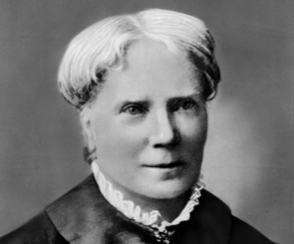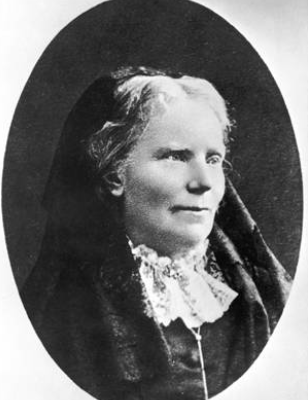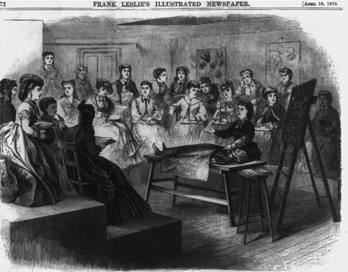 |
| (http://www.thefamouspeople.com/profiles/elizabeth- ()) |
Dr. Elizabeth Blackwell once said, "If society will not admit of woman's free development, then society must be remodeled" (Lewis, Jone Johnson). As quoted, remodeling society was precisely what Elizabeth Blackwell did. Her life was dedicated to the notion of equality: "Elizabeth Blackwell was born in Bristol, England in 1821, to Hannah Lane and Samuel Blackwell. Both for financial reasons and because her father wanted to help abolish slavery, the family moved to America when Elizabeth was 11 years old. Her father died in 1838. As adults, his children campaigned for women's rights and supported the anti-slavery movement." (U.S. National Library of Medicine). The educated childhood Elizabeth lived strongly constructed her values on equality for all human beings. Her insight and strive for success carried her all the way to being the first woman in medical school in 1847 as said in the article "Elizabeth Blackwell": "After being rejected by every medical school she applied to because she was a woman, Blackwell was finally admitted to Geneva Medical School in Geneva, New York" ("Elizabeth Blackwell"). Medical school launched Elizabeth into fulfilling her purpose of succeeding in helping other women. Several accomplishments include: serving as chair of gynecology at the London School of Medicine for Women in 1875, establishing her own hospital in New York, and being the first women admitted to the Medical Register of the United Kingdom in 1859. These astounding events would have never been accomplished without Elizabeth's prominent traits. To be intelligent one must have immense wit and be aware of issues going on around them. And with intelligence, comes perseverance, which is to make achievements despite life's obstacles using intellect and determination. Elizabeth Blackwell is a phenomenal role model and hero because, with her intelligence and perseverance, she was able to defy the odds during sexist times.
 |
| (https://selfrescuingprincesssociety.blogspot.com/2 ()) |
Elizabeth Blackwell's intelligence led her to have an educated life in which she was able to utilize her intellect to contribute to the solution of many issues, including the lack of women's rights and clean hospitals. In 1847, Blackwell entered Geneva Medical College deservingly, but the other male students thought otherwise: "Her acceptance by the small Geneva Medical College (now Hobart College) in Geneva, New York was something of a fluke: the faculty was opposed to admitting a woman, but rather than appear close-minded on the subject, they asked the students to vote on her application. Apparently treating the matter as a joke, the male students voted unanimously to accept Blackwell" ("Elizabeth Blackwell"). Despite the consistent harassment and doubt from her male colleagues, Blackwell was confident and endured negativity from her male peers throughout medical school. Her intelligence, education, and knowledge about important issues enabled her to take this opportunity to prove that women have the ability to achieve in the medical realm. One of Blackwell's most significant accomplishments occurred when she took into account what her sick friend, Nightingale, complained about regarding the sanitary conditions of hospitals: "Blackwell supported Nightingale's quest for cleaner hospitals and realized that she had many ideas of her own for improving health care, such as washing hands before surgery and using sanitized beds. But every time she made a suggestion to the hospital administration, her idea was ignored." ("Elizabeth Blackwell"). Blackwell's knowledge of the importance of proper sanitary conditions at a hospital underscored her awareness of basic health issues. This is especially noteworthy given that most doctors at that time did not acknowledge the relationship between germs and infections, causing many diseases to spread. However, what is striking is how she found her own way to stand out from her male counterparts, which is an issue that many women, including myself, still face today. Her contributions to providing healthcare for women, more sanitary hospitals, and making it possible for women to pursue medical school substantiates her intellect and heroism.
 |
| (https://www.nlm.nih.gov/exhibition/blackwell/caree ()) |
Elizabeth Blackwell had to persevere through tough conditions to follow her dreams. According to the article "Elizabeth Blackwell," it was not easy for Elizabeth set up her own hospital: "Convinced that opportunities for women doctors in America were improving, Blackwell decided to settle in New York. In 1853 Blackwell began her battle to establish a dispensary and hospital where women physicians could obtain clinical experience while serving the poor... The New York Infirmary for Women and Children was a pioneering effort and the first time a hospital was conducted entirely by women. The hospital was needed because female medical graduates were denied essential hospital experience and instruction." ("Elizabeth Blackwell"). The obstacle of being a woman attempting to establish a hospital was nothing in the face of Dr. Blackwell. Helping indigent women and children, showed how caring Blackwell was, given the difficulty of having access to proper medical care during that time period. Moreover, she never gave up on what she started, which led to her success of her own hospital. Before Blackwell set up her hospital, she faced grim circumstances once she lost her eye. Initially, she was,"denied access to Parisian hospitals because of her gender," which led her to enroll "at La Maternité Hospital, a highly regarded midwifery school, in the summer of 1849. Just four months after she arrived, she contracted an eye infection from a patient that left her blind in one eye and ended her dream of becoming a surgeon. Undaunted, Blackwell moved to London, England, to practice medicine at St. Bartholomew's Hospital" ("Elizabeth Blackwell"). For most people, losing an eye can become a hindrance in their life. However, Blackwell was able to see one door open as another one closed and continued with her medical work and endeavor to prove her competency as a female physician. Without courage and perseverance in a climate of negativity, she would not have made said accomplishments, which impacted the future of women in the medical field. With her intestinal fortitude and hard work, Dr. Blackwell made what was thought of as impossible, possible.
Through thick and thin, Elizabeth Blackwell persisted through life's obstacles. Personally, I aspire to possess the same perseverance and intelligence that Blackwell maintained through her lifespan. She progressed beyond the limited social standards of her time and singlehandedly became the first female doctor. She established a hospital that gave female physicians clinical experience while treating the poor. Losing an eye did not slow her down in all the accomplishments she had yet to make. Undaunted by the walls of sexism and intolerance, Elizabeth tore them down day by day: "Though it was not seen as proper for women to discuss topics that had to do with their bodies, Blackwell began giving a series of lectures at her clinic and on the streets about cleanliness, birth, reproduction, and how the female body should be cared for. In 1852, her lectures were published as a book, The Laws of Life in Reference to the Physical Education of Girls" ("Elizabeth Blackwell"). Dr. Blackwell saw an issue and took action on it. Rather than being abashed by the topic of women's health she fought against the social construct of it being awkward and unmentionable. She is an inspiration due to how she broke these boundaries on society's stereotypes and sought to educate women on their bodies. Fortunately, many girls and women today are provided the proper information on their bodies as a result of Blackwell's contribution to women's health awareness. In addition, her efforts inspire me to pursue my goals of becoming a plastic and reconstructive surgeon. Her legacy of being the first female doctor proves to young women everywhere that the impossible is always possible.
Works Cited "Elizabeth Blackwell." Notable Women Scientists, Gale, 2000. Biography in Context, link.galegroup.com/apps/doc/K1668000036/BIC1?u=powa9245&xid=ccc94954. Accessed 17 May 2017. "Elizabeth Blackwell." Science and Its Times, edited by Neil Schlager and Josh Lauer, vol. 5, Gale, 2000. Biography in Context, link.galegroup.com/apps/doc/K2643411693/BIC1?u=powa9245&xid=f5bdbdfd. Accessed 17 May 2017. "Elizabeth Blackwell." Scientists: Their Lives and Works, UXL, 2006. Biography in Context, link.galegroup.com/apps/doc/K2641500230/BIC1?u=powa9245&xid=b22eb93e. Accessed 17 May 2017. "Elizabeth Blackwell." World of Health, Gale, 2006. Biography in Context, link.galegroup.com/apps/doc/K2191100037/BIC1?u=powa9245&xid=3cb8ba48. Accessed 17 May 2017. Lewis, Jone Johnson. "Quotes from Pioneer Physician Elizabeth Blackwell." ThoughtCo, ThoughtCo., 1 July 2016, www.thoughtco.com/elizabeth-blackwell-quotes-3528554. Accessed 17 May 2017. U.S. National Library of Medicine. "Changing the Face of Medicine | ElizabethBlackwell." U.S. National Library of Medicine, National Institutes of Health, 3 June 2015, cfmedicine.nlm.nih.gov/physicians/biography_35.html. Accessed 17 May 2017.
Page created on 5/20/2017 12:00:00 AM
Last edited 5/20/2017 12:00:00 AM
